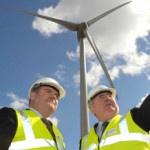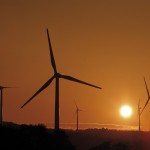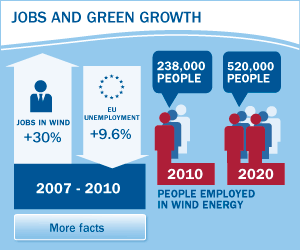
Anni Podimata, VP of European Parliament
Wind will be at the centre of Europe’s power needs, meeting 50% of electricity demand by 2050, Robert Clover from MAKE Consulting said today. Moreover, “after 2020 wind is the cheapest technology, it is scaleable and it has minimal water requirements,” he added.
Speaking at EWEA’s 2013 Annual Event in Vienna, Clover said onshore wind will achieve parity with other electricity-generating technologies feeding into the grid in Europe by 2015, followed by offshore in 2022/2023.
Clover’s opinion was backed by several high-level speakers at EWEA 2013 including Fatih Birol, Chief Economist at the International Energy Agency, who said that almost all onshore wind projects in Europe will be fully competitive with gas very soon.
Clover added another element to the cost of energy debate by saying that if carbon capture and storage (CCS) technology is added to thermal generation, then costs could rise by up to another 50%.
continue reading »
 Comments Off on Wind will be cheapest electricity generating technology by 2020
Comments Off on Wind will be cheapest electricity generating technology by 2020

Fatih Birol at the EWEA 2013 Opening Session
Fossil fuel subsidies – which amounted to half a trillion US Dollars worldwide in 2011 – are effectively an incentive to pollute and as such are “public enemy number one to sustainable energy development,” Fatih Birol, Chief Economist at the International Energy Agency said at EWEA’s 2013 Annual Event in Vienna on Monday.
Christian Kjaer, EWEA CEO, added that European citizens are transferring a rapidly rising share of their wealth to a handful of fossil fuel exporting countries. “In 2009 the EU spent €274 billion on fossil fuels imports – 2.1% of its GDP, a level which increased by €200 billion or 70% over just three years to 2012,” he said. “Today, EU citizens are spending half a billion Euros more each day on fossil fuel imports than they were three years ago,” he added.
“Fossil fuel subsidies do not make sense,” Birol said. Subsidies keep fossil fuels artificially cheap and without a phasing out of fossil fuel subsidies, we will not reach our climate targets. “I hope governments pay attention this,” Birol stated.
continue reading »
 The European Commission needs to provide data to compare subsidies for renewables with the “far less transparent” subsidies for coal, oil, gas and nuclear, Irish Energy Minister and current EU President Pat Rabbitte says in the latest Wind Directions magazine.
The European Commission needs to provide data to compare subsidies for renewables with the “far less transparent” subsidies for coal, oil, gas and nuclear, Irish Energy Minister and current EU President Pat Rabbitte says in the latest Wind Directions magazine.
Minister Rabbitte, who is one of the keynote speakers at the opening session of EWEA 2013 this morning, also warns that moving to a 2030 low carbon target would be damaging to the 2020 renewable energy target.
The minister also discusses energy security, highlighting the role of renewables in reducing future “volatility”.
Read the full interview and more in the latest Wind Directions
 People who work in the Spanish wind energy sector will no doubt be sharing great news with those attending next week’s EWEA 2013 Annual Event in Vienna: the nation’s monthly wind-power output exceeded 6 terawatt-hours for the first time in January.
People who work in the Spanish wind energy sector will no doubt be sharing great news with those attending next week’s EWEA 2013 Annual Event in Vienna: the nation’s monthly wind-power output exceeded 6 terawatt-hours for the first time in January.
The Spanish Wind Energy Association’s blog, Somos Eolicos, reported that amount of power would be enough to light most households in the nation.
Bloomberg reported that the association — using data from grid operator Red Electrica de Espana — said the milestone was passed Tuesday this week from 3 p.m. to 4 p.m. local time.
continue reading »
 Around 2,000 jobs could be created every year up to 2050 in Wales, and €2.7 billion injected into the Welsh economy, if the Welsh government target for 2,000 MW of onshore wind capacity by 2025 is met, a new report by RenewableUK – an industry body – and the Welsh government claims.
Around 2,000 jobs could be created every year up to 2050 in Wales, and €2.7 billion injected into the Welsh economy, if the Welsh government target for 2,000 MW of onshore wind capacity by 2025 is met, a new report by RenewableUK – an industry body – and the Welsh government claims.
However, if approval rates for onshore wind farms continue at the same pace as they have from 2001-2011, the total contribution to the Welsh economy would fall to €1 billion with only 1,000 jobs created per year.
“Without a significant shift in the consenting rate, and in the overall approach of planning policy in Wales to this sector, we will continue to be held hostage by rising fossil fuel prices and we will fail to meet our renewable energy ambitions with a corresponding missed opportunity to generate livelihoods for more than 2,000 people in Wales,” David Clubb, Director of RenewableUK Cymru, said.
continue reading »
 Comments Off on Welsh economy could receive 2.7 billion euro boost with onshore wind
Comments Off on Welsh economy could receive 2.7 billion euro boost with onshore wind












